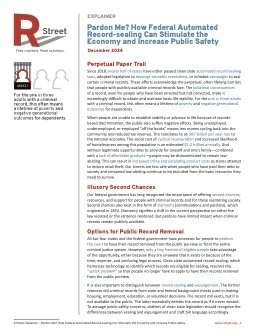By Christi M. Smith
One in three Americans, roughly 70 to 100 million, have a criminal record that limits their earning capacity and options for suitable housing, as well as makes it more challenging to remain law-abiding. These records are often not the result of serious or violent crime, but rather due to the ever-widening net of “tough-on-crime” legislation that criminalizes poverty, substance use and mental illness. Socioeconomic and behavioral health issues combined with the collateral consequences of an arrest or criminal record make it nearly impossible for individuals to secure or maintain minimum standards of social stability. Absent legitimate opportunities to provide for themselves and their families, some may feel compelled to resort to crime to mitigate stress and account for their most basic needs. This situation subjects law-abiding members of the community to additional crime and escalating product costs associated with increased security-related expenses. Taxpayers also incur the ballooning expense of funding low-level law violator involvement in the justice system and bear the burden of the social costs of record-based discrimination, including a rise in homelessness, a lack of generational mobility and the need for various forms of public assistance. Record-based discrimination is extremely costly to taxpayers and the overall economy, resulting in an estimated $78-$87 billion loss in the national gross domestic product. While the majority of states offer some form of petition-based record sealing, fewer than 10 percent of eligible individuals pursue the option, owing to the cost and complexity of the process. Clean Slate legislation bridges the gap between eligibility and opportunity by automating the process of sealing old records at no cost to the individual. Public safety carve-outs that exclude certain convictions from eligibility; provide access to the records under speci昀椀c and limited circumstances; and include provisions for employer immunity reduce the risk of sealing records from community access. When these records are not available to the general public, the collateral consequences of arrest or conviction no longer present a pervasive barrier to the resources people need to fully reintegrate into the community. Armed with the ability to provide for oneself and thrive in mainstream society, individuals are less likely to return to crime and be琀琀er equipped to contribute to the overall economy. Clean Slate legisla琀椀on is the pathway to prosperity for all Americans. It is a model policy with bipar琀椀san, bicameral and public support. Free, automatic record clearing is smart public policy that reduces recidivism, increases public safety and stimulates the economy. Key Points: 1. Individuals with prior arrests or convictions records experience a host of collateral consequences that limit their access to stable housing, employment, education, food and financial assistance. These barriers unduly burden the individual, their families and communities long after the initial sentence has been served and the debt to society has been repaid. 2. The majority of states offer petition-based record sealing to remove these records from public view, though fewer than 10 percent of eligible individuals take advantage of this opportunity owing to the complexities and costs associated therewith. 3. Individuals who have demonstrated the ability to remain law-abiding in the years following the completion of their sentence are no more likely to reoffend than their counterparts without criminal histories. Automatic record sealing through Clean Slate legislation prioritizes public safety and ends the cycle of punishment in perpetuity for eligible people by allowing them to fully reintegrate into their communities and contribute to the overall economy.
R Street Policy Study No. 279, Washington, DC: R Street, 2023. 19p.



